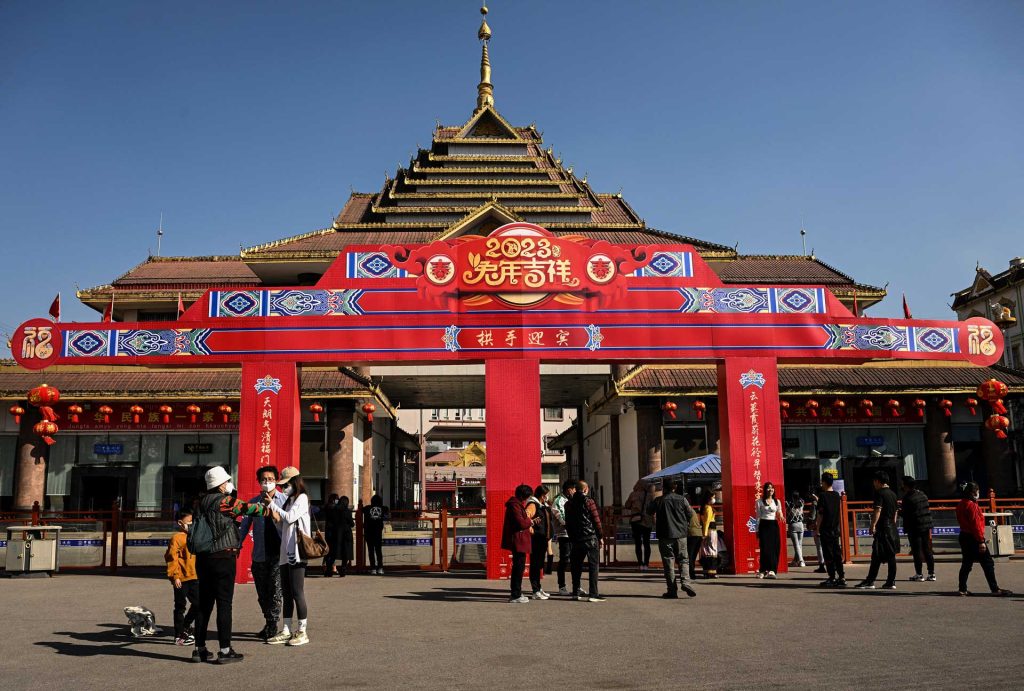ISP Explainer No. 01
(This article is a translation of the original Burmese language version that ISP-Myanmar posted on its Facebook page on March 23, 2023.)
This explainer describes significant developments in Sino-Myanmar relations based on ’China Timeline’ complied by ISP-Myanmar. Since post-COVID China’s “Grand Opening”, China has focused on promoting economic activities and combating transnational criminal activities and has met with Ethnic Armed Organizations (EAOs) on the Sino-Myanmar border to foster closer cooperation. On the other hand, China sees worrying political developments in Myanmar, as the West, especially the United States, seems increasingly willing to intervene in the Myanmar conflict. Beijing dispatched a special envoy to Myanmar to boost engagement and cooperation with both the State Administration Council (SAC)and EAOs from the Northern Alliance. In response to China’s latest efforts, seven EAOs including United Wa State Army (UWSA) have welcomed China’s increased involvement in Myanmar’s affairs in a statement made after top leaders met. Despite Beijing having downgraded its diplomatic relationship with Naypyitaw, Yunnan’s provincial government appears to be more assertively promoting economic relations with the junta.
∎ Summary of 49 Issues
When analyzing the Sino-Myanmar relations timeline collected by ISP-Myanmar from February 8 to March 16, 2023, a total of 49 issues can be identified (See table No. 1) with the dominant subjects being geopolitics, political economy, and diplomacy. In this explainer, ISP-Myanmar would like to describe five key developments.
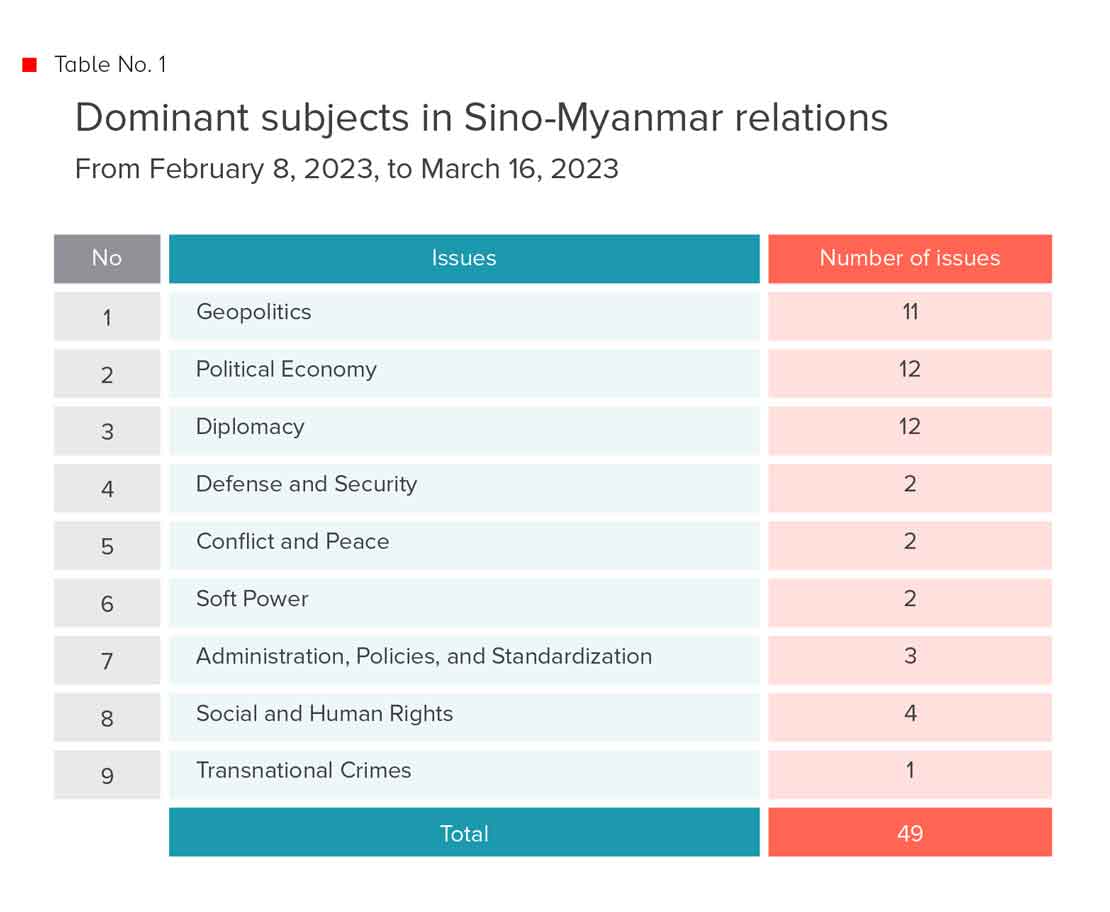

1. China’s attempt to combat transnational crime
As a measure to control transnational crime, Chinese authorities warn citizens from Hubei, Hunan, and Sichuan provinces of travel restrictions to eight countries including Myanmar, as Chinese gang related activities not only tarnish Belt and Road Initiative (BRI) projects but also that illegal gang activities threaten the security of Chinese citizens.
Those Chinese citizens who have necessity to travel to these countries must receive approval from their residential community or village as well as the local police station. According to China’s Supreme People’s Court data for 2022, telecom and internet fraud were the third most common criminal trials in China. According to the Ministry of Public Security, China has solved 319,000 cases of telecom and internet fraud, as well as 37,527 cases of cross-border gambling in 2022. Chinese officials seriously targeting combating these types of electronic crime shouldbe a warning to cross-border criminal activities in China’s bordering nations, including in Myanmar.
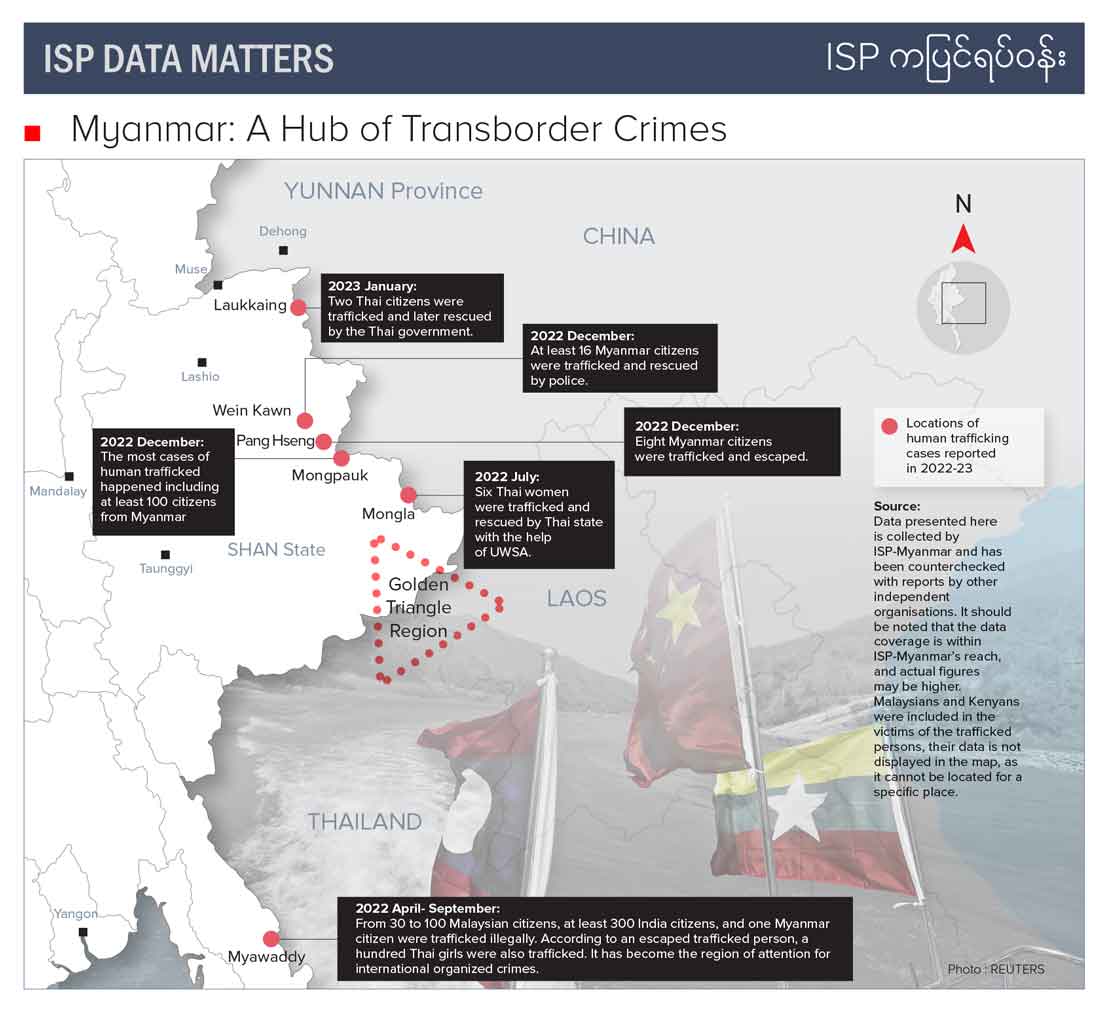
In the post-coup period, Myanmar has become a hub for cross-border criminal activities. At least three Chinese satellite towns at the Thailand-Myanmar border, including the infamous Shwe Kokko, have emerged as centers for gang and online crime activities, illegal casinos and other gambling, and human trafficking. Areas near the Sino-Myanmar border under UWSA’s control have reported an increase in cases of human trafficking. More reports have emerged from Myanmar’s border regions, that not only Myanmar locals, but also citizens from Thailand, Malaysia, India, the Philippines, and Kenya are recruited, trafficked, and forced to work in illegal activities in these regions. (please see ISP Insight Email Special Edition “The Bricks Have Fallen”). For this reason, when the Chinese special envoy, Mr. Deng Xijun met with EAOs based on the Sino-Myanmar border, he welcomed the EAOs’ closer cooperation in combating cross-border crime in addition to building border stability.
2. Chinese envoy Mr. Deng Xijun’s trips
After the U.S. enaction of the National Defense Authorization Act (NDAA), the Chinese authorities have built closer relations with the EAOs, many of which are usually referred to as having close ties to China. The 2023 NDAA stated that the U.S. will support technical assistance and non-lethal aid to EAOs, People’s Defense Forces (PDFs), and the democratic opposition in Myanmar. The United States’ potential for intervention in Myanmar’s political process could be alarming China, resulting in China expanding its diplomatic efforts.
Mr. Deng Xijun, China’s Special Envoy for Asian Affairs, successor of Mr. Sun Guoxiang, has now made several visits to Myanmar. After the initial three months of his tenure, Deng Xijun met twice with Ethnic Armed Organizations (EAOs) in northern Shan State, including Mongla, Wa, and Kachin, as well as with the SAC. [Please see ISP’s Insight email No. 10.] During the meeting on February 18-19, 2023, he urged the northern EAOs to hold talks with the SAC, not to accept U.S. Defense assistance, and not to allow illegal activities to be based in EAO-controlled areas. China appears to not want instability on its border flaring from Myanmar’s conflicts as the People’s Defense Forces (PDFs) grow with the support of some EAOs in northern Shan State1.
Mr. Deng paid a visit to Naypyitaw on March 6, 2023, his second, and met with the chairman of the SAC. Their discussion went ventured into economic cooperation, which was significant as prior meetings had routinely focused on border stability and peace. From Mr. Deng’s meetings it is clear that at a time of post-COVID border openings, China desires to promote trade, maintain a stable border, and revive China-Myanmar Economic Corridor projects (CMEC).
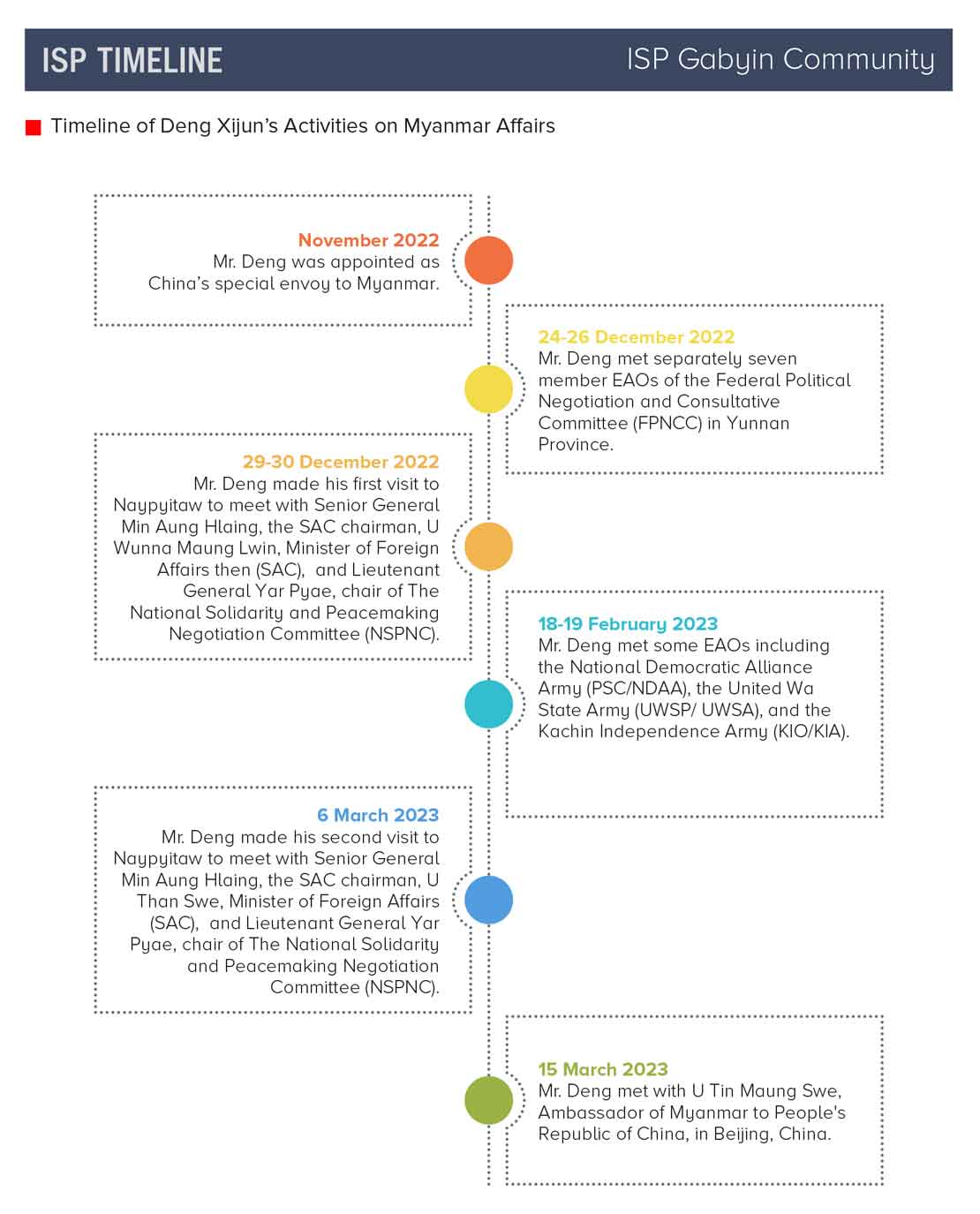

3. FPNCC welcome China’s intervention
Just after Mr. Deng’s visit to northern Myanmar, leaders of the Federal Political Negotiation and Consultative Committee (FPNCC), a coalition of seven EAOs including UWSA, held a meeting and issued a statement. In the March 15-16 statement at PangKham of the Wa Self-Administered Division, the FPNCC “welcomed China’s intervention to resolve the conflicts in Myanmar”. The alliance group statement also said the group was “assuming to build a Federal Union, with the Burman mainland after building a comprehensive peace. But the minority ethnic groups must rely on themselves and strive towards it, although there are many means to implement the above postulation.”
These developments demonstrate that China will seemingly become increasingly involved in the conflicts in Myanmar. China’s initiative could be either in response to perceived consequences of the U.S. National Defense Authorization Act (NDAA) or China’s intention to promote trade, investment, and economic projects in Myanmar in the post-Covid. However illegal trade is also surging in China-Myanmar bilateral trade in the post-coup era (Please see ISP’s Data Matters No. 41). China’s initiatives align not only with the interests of the SAC but also with the EAOs operating along the border areas. These areas should be monitored closely to detect any signs of a scenario developing similar to the post 1990s “ceasefire capitalism”.

4. China’s ambassador to Myanmar observes preparations for Rohingya refugee repatriation
China’s ambassador to Myanmar, Mr. Chen Hai, visited Rakhine State on March 8-9 to observe preparations for Rohingya refugee repatriation. U Ko Ko Hlaing, SAC Minister for International Cooperation invited diplomats, including Mr. Chen Hai, as well as ambassadors from India, Bangladesh, and ASEAN nations, and delegates from the ASEAN Coordinating Centre for Humanitarian Assistance on Disaster Management (AHA Centre). China will support the first attempt at Rohingya repatriation and will cooperate in infrastructure development and business development with Chinese companies, Mr. Chen said. Myanmar has been encouraging Rohingya repatriation since 2007, with Chinese government support under a bilateral agreement between the Myanmar and Bangladesh governments which has yet to be implemented.
The Chinese Ambassador also visited the site of the Kyaukphyu power plant, invested in by state-owned Power China. The project is an important project under the CMEC in Myanmar’s western Rakhine State along with a strategic deep seaport, a renewable power plant, and other Chinese investments. The SAC chairman said on 28 February 2023 that Myanmar will implement the Kyaukphyu deep seaport project after comprehensive assessments.

5. China’s new approaches through Yunnan
Since China ended its zero-COVID policy, the Chinese government has fostered trade promotion with Myanmar. On February 14-15, Mr. Li Chenyang, the director general of Yunnan provincial Department of Commerce met with junta officials in Naypyitaw and also visited the Union of Myanmar Federation of Chambers of Commerce and Industry (UMFCCI)in Yangon. It was China’s first official provincial level visit since the COVID pandemic and the delegation discussed the promotion of trade and economic activities.
On February 15, at the meeting with the UMFCCI, Mr. Li raised the idea of practical cooperation in the areas of border trade, agriculture, electricity, and infrastructure. Around a hundred business personnel from China and Myanmar attended the meeting. Mr. Li said Myanmar is Yunnan’s largest trade partner and asked for deeper cooperation in trade. Although Beijing has downgraded its diplomatic relations with Myanmar’s military junta, China has been promoting strategic investments through the Yunnan provincial-level authorities.
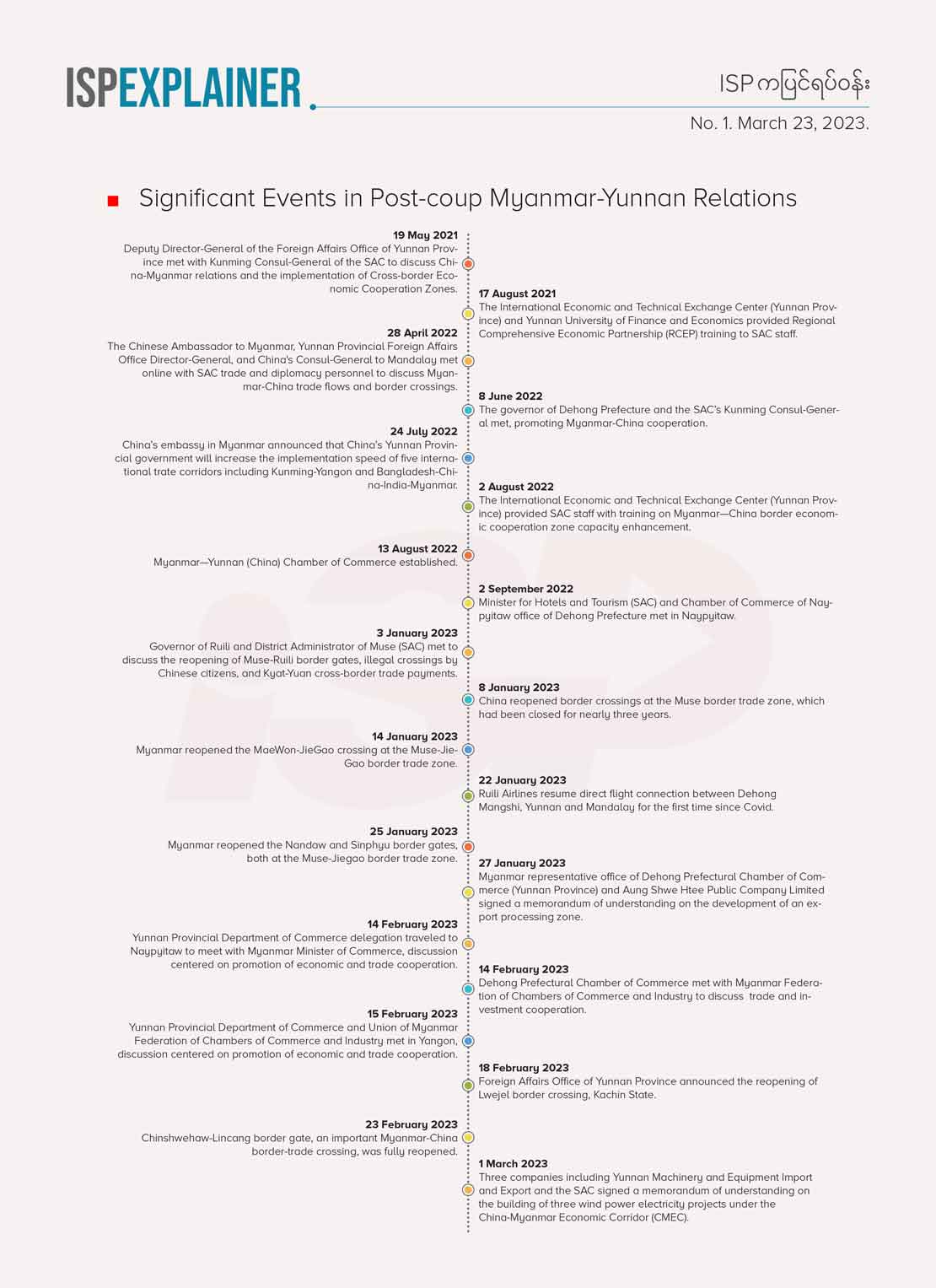
On February 14, 2023, Yunnan Province’s Dehong Dai and Jingpo Autonomous Prefecture Department of Commerce discussed trade and investment with the UMFCCI. Dehong’s Department of Commerce is considering building an export processing zone and signed an MoU with Aung Shwe Htee public company limited2. The export processing zone under the name of “Shwedon AYA Export Processing Zone” will be developed in Nyaungdon township of Ayeyarwady Region.
The project will include various firms and sectors, including agriculture, animal husbandry, food processing, and Cut-Make-Pack (CMP) garment factories. In addition, 21 businessmen from the Mandalay chapter of UMFCCI made an observation visit to Ruili and Mangshi on March 14. Chinese officials invited them to study the Ruili border crossing and agricultural and industrial firms in Ruili and Mangshi, which play a major part in the China-Myanmar Cross-border Economic Cooperation Zones (CBECZ) system under the CMEC. China apparently intends to foster more cross-border economic cooperation and joint-work zones.

While the Chinese government is making efforts to enhance economic cooperation through Yunnan provincial officials, another interesting development is the agreement on the MoU for three wind-powered turbine projects. On March 1, 2023, three Chinese companies signed MoUs with Myanmar’s junta for constructing three wind-turbine projects in Ann, Gwa, and Thandwe Townships of Rakhine State. They are the Yunnan-based Yunnan Machinery and Equipment Import and Export Co. Ltd., Hong Kong-based Asia Ecoenergy Development Ltd., and Myanmar’s Primus Advanced Technologies Ltd. The wind-turbine projects will produce a total generating capacity of 360 MW by 2025.
U Tin Maung Swe, SAC Ambassador to China met with the chairman of Power China in Beijing on February 13, 2023, and discussed the promotion of renewable energy projects in Myanmar. Since the coup, the Chinese company has been developing the Combined Cycle Power Plant (CCPP) in Kyaukphyu, and solar electricity generation projects in Pwint Phyu, Myitthar, and Shwekyin Townships. In addition, Myanmar’s junta made a statement on February 15, 2023, that the two countries will set up a China- Myanmar Energy Cooperation body to oversee the construction of a cross-border grid. This demonstrates that Myanmar will play an important role in fulfilling the demand for electricity in Yunnan province.
References
Bhaya, A. G. (2017, November 23). Bangladesh, Myanmar sign off on Rohingya refugee repatriation deal. CGTN. https://news.cgtn.com/news/306b6a4e78637a6333566d54/share_p.html
Dazhou People’s Government. (February 24, 2023) Order for travel restrictions to eight countries including Cambodia 紧急提醒!非必要不得前往这些地方.
https://www.dazhou.gov.cn/news-show-245599.html
Guoping, L., Ruohong, F., & Jia, D. (2023, March 1). China’s Yunnan whacks power usage by aluminum producers again. Nikkei Asia. https://asia.nikkei.com/Spotlight/Caixin/China-s-Yunnan-whacks-power-usage-by-aluminum-producers-again?fbclid=IwAR2v_sWDlKyOA2q3uweNvf9Oly_pywF2LwJB8aukUORseah9qg5TmUnWkq8
Hadano, T. (2023, March 8). China to move finance and tech under direct party oversight. Nikkei Asia. https://asia.nikkei.com/Politics/China-People-s-Congress/China-to-move-finance-and-tech-under-direct-party-oversight
NPC Observer. (2022, September 7). Law Against Telecom and Online Fraud. NPC Observer.
https://npcobserver.com/2022/09/07/legislation-summary-chinas-new-law-to-fight-telecom-and-internet-fraud/
Xinhua. (2023, February 27) Second Plenary Session of the 20th Central Committee of the Communist Party of China Held in Beijing 中国共产党第二十届中央委员会第二次全体会议在北京开始举行.
http://cpc.people.com.cn/n1/2023/0227/c64094-32631783.html
Xinhua News (July 22, 2022) Supreme People’s Procuratorate: Aiding and abetting cybercrime has become third most prosecuted crime 最高检:帮信罪已成为刑事犯罪起诉人数排第三的罪名.
http://www.news.cn/legal/2022-07/22/c_1211669528.htm

